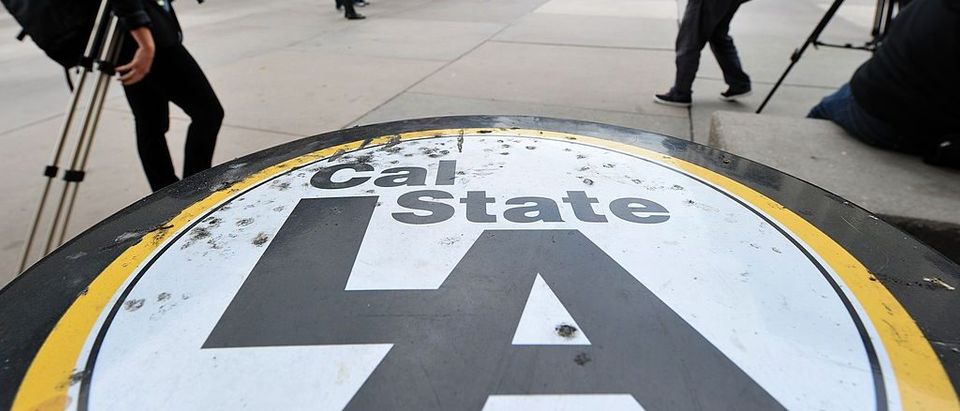Are University of California academics who engage in anti-Israel activism subject to “silencing”? Such were the strident cries on October 27, when about one hundred students gathered on a cloudy morning outside of Sproul Hall at the University of California, Berkeley for the 3rd Annual International Day of Action for Palestine.
Organized by Students for Justice in Palestine (SJP) and Bears for Palestine, the rally featured Israel-bashing, BDS-promoting professors Hatem Bazian and Rabab Abdulhadi, who insisted over loudspeakers that they were being repressed by the UC system.
Bazian, director of UC Berkeley’s Islamophobia Research & Documentation Project, announced that “Palestine faces a whole structural silencing on this campus.” Likewise, Abdulhadi, director of San Francisco State University (SFSU)’s Arab and Muslim Ethnicities and Diasporas Initiative and a founding member of the U.S. Campaign for the Academic and Cultural Boycott of Israel, declared, “We are here for our freedom of speech!”
According to Bazian, the primary example of this alleged suppression was the initial cancellation, due to widespread criticism, of a student-led UC Berkeley course for which he’s the faculty sponsor, “Palestine: A Settler Colonial Analysis.” He didn’t mention that the course, which encourages the elimination of Israel as the nation-state of the Jewish people, was reinstated with minimal alterations.
Meanwhile, Abdulhadi’s grievances were directed at the David Horowitz Freedom Center’s (DHFC) recent placement on campus of posters featuring the worst of her anti-Israel activities and its listing SFSU and UC Berkeley in its top five “Top Ten Schools Supporting Terrorists in the United States.” This followed Campus Watch’s recent campaign highlightingAbdulhadi’s role as architect of SFSU’s Memorandum of Understanding (MOU) with Hamas-dominated, terror-friendly An-Najah University in the West Bank and demanding an end to the MOU.
Although Abdulhadi clearly uses her position at SFSU to encourage hatred and violence toward Israel, she bellowed that critiquing such bigotry is a form of bullying: “They are trying to have a chilling effect—McCarthyism—to silence us, to intimidate us, to bully us, in a very violent, racist, Islamophobic, and vicious campaign in order to silence us!”
She then charged that “They come in the middle of the night. They put up [sic] intimidation and run away, exactly like the Klan does, exactly like the Israeli military does that comes and raids Palestinians in the middle of the night!”
That Abdulhadi would equate DFHC’s poster campaign with Klansmen torching crosses on the lawns of African-Americans, or lynching them for the crime of being black, exposes her intellectual and moral bankruptcy. Anti-Israel activists often equate their “struggle” with that of other minorities, however dissimilar, in order to foster sympathy and excuse violence against Israelis.
Accordingly, both Bazian and Abdulhadi suggested that the “social justice” movements of the 1960s were in spiritual kinship with anti-Zionism. As Bazian asserted, “It is the place where the Vietnam [anti-war] movement was. It is the place where the free speech movement [and] the environmental movement is today—and the time [sic] for us.”
In a dignified response, student groups Bears for Israel, Tikvah, and Hillel quietly formed a line and turned their backs on the speakers while holding aloft Israeli flags. In defiance of the BDS movement’s “anti-normalization” policy, a student with an Israeli flag could be seen politely chatting with a student holding a Palestinian flag on a balcony across from Sproul Hall.
If there is ever to be hope for a peaceful resolution to the Arab-Israeli conflict on U.S. college campuses, it will come from such students. It will never come from academic activists like Abdulhadi and Bazian, who want nothing more than to use their taxpayer-funded positions to foment the hatred of Israel. Their vitriol, which is mirrored on campuses nationwide, proves that not only are anti-Israel professors not silenced on campus, but are in fact the loudest voices in academe.
Michael Lumish is an analyst on the Arab-Israeli conflict and the proprietor of Israel Thrives. He holds a Ph.D. in American History from the Pennsylvania State University and has taught at Penn State, San Francisco State University, and City College of San Francisco. He writes for Campus Watch, a project of the Middle East Forum.


